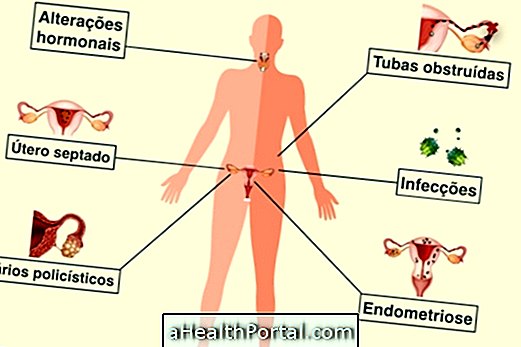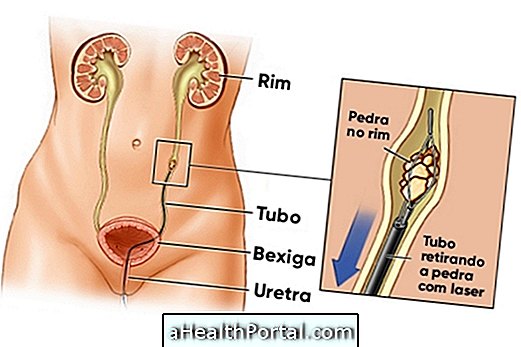Menstruation is a bleeding that usually occurs in women once a month as a result of the peeling of the inner lining of the uterus, the endometrium. Usually, the first menstruation occurs between the ages of 9 and 15, with the average age being 12 years, and only stops occurring at menopause, close to 50 years of age.
The female reproductive system works every month to produce and eliminate an egg, that is, it prepares to become pregnant. If the woman does not have contact with a spermatozoon, there will be no fertilization and, about 14 days after the release of the egg, menstruation arises. From there, in each month, a new cycle begins, so that the uterus prepares itself again for a new ovulation and that is why menstruation descends every month.

1. How long does menstruation last?
Each menstruation lasts approximately 4 to 7 days, but the interval between one menstruation and another lasts an average of 28 days, and can vary from 25 to 45 days, being influenced by factors such as stress, hormonal changes, diseases or simply the existence of a irregular menstruation. Menstruation lasting 8 days or more is considered prolonged, but can not be considered a menstruation that comes in just 1 day, in which case it is likely to be an escape bleed.
Calculate your menstrual cycle by entering your following data:

2. Is it normal to menstruate twice a month?
It may be normal for menstruation to come twice a month with shorter cycles, especially in the first few months because the girl's body is still organizing at the hormonal level. It can also happen that menstruation becomes very irregular and come more than once in the month after delivery in the first menstrual cycles. In older women, this change can be caused by:
- Uterine myoma;
- Excessive stress;
- Cancer;
- Polycystic ovary;
- Ovarian cyst;
- Use of some medicines;
- Hormonal and emotional changes;
- Ovarian and tubal surgery.
So if this change happens too often, it is important to tell the gynecologist the specific days on which the menses came and all the associated symptoms so that you can identify the cause of the menstrual imbalance.
3. What can be delayed menstruation?
Delayed menstruation in women with an active sex life is usually soon associated with pregnancy, but this is not always true. Factors such as ovarian cysts, uterine diseases, anemias, psychological changes such as depression and anxiety, changes in routine, poor dietary habits, unbalanced diets or even the stress itself of being thought to be a pregnancy may be responsible for the delay in menstruation. If this happens regularly, for many months, you should seek a gynecologist to better evaluate the possible cause of the delay.
Understand the major causes that may cause missed or delayed menstruation.

4. What can cause irregular menstruation?
Irregular menstruation can occur in the first two years after first menstruation because the body is still learning to deal with hormones, which usually regulates after age 15. In these cases, some home remedies that help regulate menstruation may be used.
However, if a marked and constant irregularity of menstrual flow occurs, it should be analyzed as it may interfere with the ovulation process. Among the most common causes are the presence of tumors, cysts, imbalance in hormone production and stress. Treatment is based on the daily use of pills to regulate menstrual flow, helping to balance any failure to produce hormones, but each case should be evaluated by the gynecologist.
5. Is it possible to have menstruation during pregnancy?
Menstruation in early pregnancy is very common and can happen in the first three months. It is also called escape bleeding because the female hormones are accustomed to working to cause menstruation, and even being pregnant, sometimes bleeding happens, causing the woman to only find out later on the pregnancy.
Other causes that can cause bleeding in pregnancy are:
- Adhesion of the fertilized egg to the wall of the uterus;
- More intense sexual intercourse;
- Performing transvaginal ultrasound or touch examination;
- In cases of assisted reproduction;
- Use of anticoagulant drugs, such as heparin or aspirin;
- Presence of fibroids or polyps;
- Infection in the vagina or cervix;
- Beginning labor if the pregnancy is longer than 37 weeks.
If bleeding develops from one of these causes, the doctor may recommend resting for a few days and the woman should avoid having sex until the bleeding passes.
In some women, especially when the blood volume is very large or accompanied by colic, it can be a miscarriage and should be treated urgently. Learn how to identify when bleeding in pregnancy is serious.
6. How does postpartum menstruation?
Postpartum menstruation will depend on whether or not the woman is breastfeeding. After the baby is born, the woman has a bleeding that can last up to 30 days, varying according to each organism and circumstances that the woman is subjected to. Mothers who exclusively breastfeed can be up to 1 year without menstruation, but if they do not breastfeed, they can have regular menstrual cycles the following month after giving birth. The most common is that the return of the menstruation is irregular, can come advanced and more than once a month, but within 3 to 6 months it should be more regulated as it was before becoming pregnant.

7. What can be dark menstruation?
Black, brown, or "coffee grounds" menstruation can occur for a number of reasons, including:
- Change of contraceptive pill;
- Hormonal changes by medications;
- Stress and psychological factors;
- Sexually transmitted diseases;
- Diseases, such as myomatosis and endometriosis;
- Possible pregnancy.
However, it is also common for some women to menstruate to become darker in the last 2 days, without having to be a sign of a problem. Learn more about the top 5 causes of dark menstruation.
8. Is menses with clots normal?
Menstruation with clots can happen on days when the flow is very intense, causing the blood to clot before it leaves the woman's body. It is a very common situation, but if you see very large or very large blood clots it is important to consult your gynecologist.
Understand better in what situations menstruation can come in pieces.
9. What does weak or very dark menstruation mean?
Very weak menstruation, like water, and very strong menstruation, type coffee grounds indicate hormonal changes that should be evaluated by the gynecologist.
10. Is menstruation good for your health?
Menstruation is an event that is repeated every month in women of childbearing age, it is not harmful to health and is physiological and expected. It occurs due to the female menstrual cycle, which passes through different times throughout the month, under normal conditions menstruation does not harm the health, but it can be said that the abundant menstruation in anemic women, can bring more complications, and in this case, for example, it may be indicated to use the continuous-use pill to avoid menstruation.
























